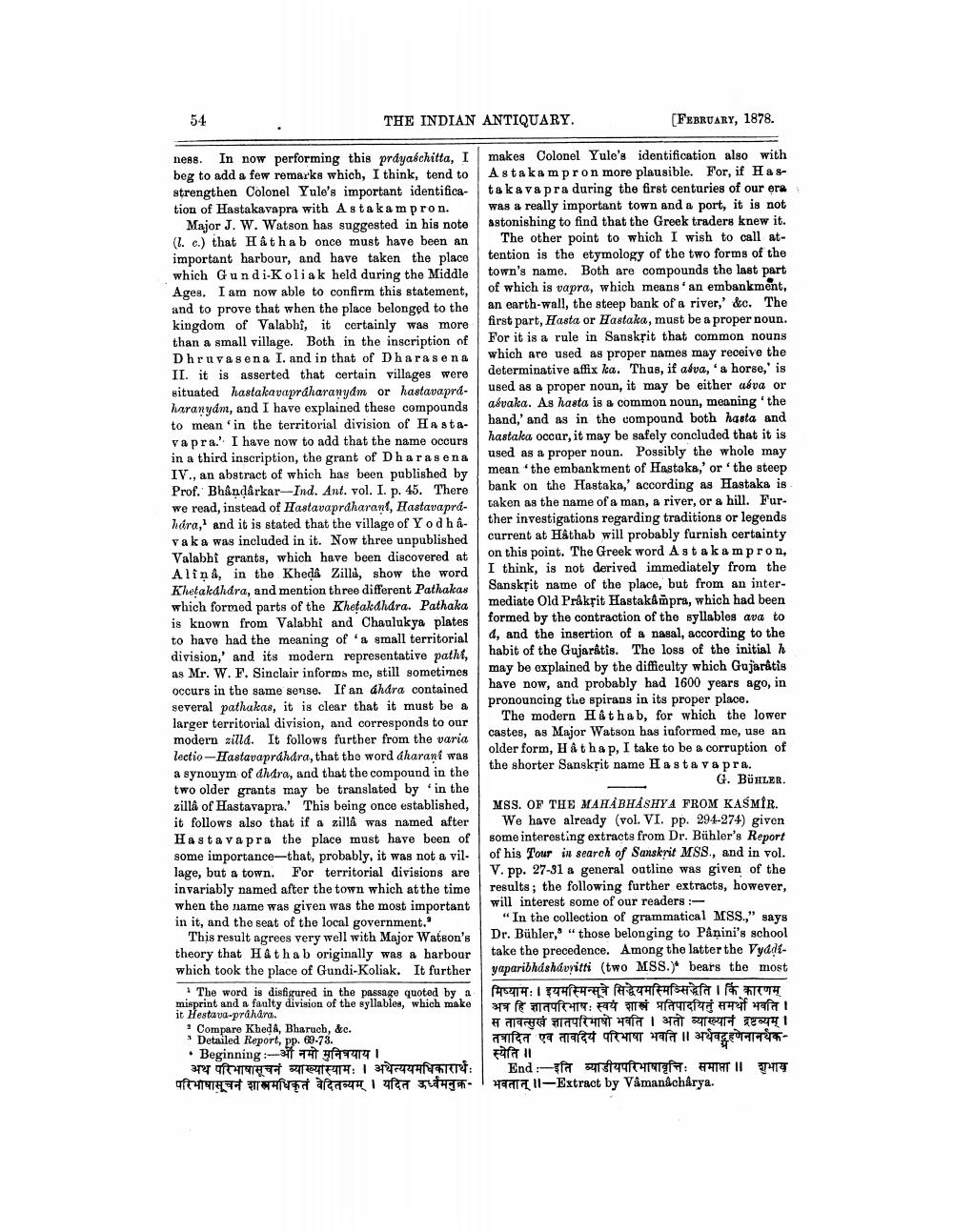________________
54
THE INDIAN ANTIQUARY.
[FEBRUARY, 1878.
ness. In now performing this prdyaschitta, I makes Colonel Yule's identification also with beg to add a few remarks which, I think, tend to Astaka mpron more plausible. For, if Hasstrengthen Colonel Yule's important identifica- takava pra during the first centuries of our era tion of Hastakavapra with Astaka mpron. was a really important town and a port, it is not
Major J. W. Watson has suggested in his note astonishing to find that the Greek traders knew it. (1. c.) that Hât hab once must have been an
The other point to which I wish to call atimportant harbour, and have taken the place tention is the etymology of the two forms of the which Gundi-Koliak held during the Middle town's name. Both are compounds the last part Ages. I am now able to confirm this statement, of which is vapra, which means'an embankment, and to prove that when the place belonged to the an earth-wall, the steep bank of a river,' &c. The kingdom of Valabhi, it certainly was more first part, Hasta or Hastaka, must be a proper noun. than a small village. Both in the inscription of For it is a rule in Sanskrit that common nouns Dhruvasena I. and in that of Dharasena which are used as proper names may receive the II. it is asserted that certain villages were
determinative affix ka. Thus, if afva,' a horse,' is situated hastakavapráharanydm or hastavapra
used as a proper noun, it may be either afva or haranydm, and I have explained these compounds
aávaka. As hasta is a common noun, meaning 'the to mean 'in the territorial division of Hasta
hand,' and as in the compound both hasta and vapra.' I have now to add that the name occurs
hastaka occur, it may be safely concluded that it is in a third inscription, the grant of Dharasena
used as a proper noun. Possibly the whole may IV., an abstract of which has been published by
mean the embankment of Hastaka,' or 'the steep Prof. Bhandarkar-Ind. Ant. vol. I. p. 45. There
bank on the Hastaka,' according as Hastaka is we read, instead of Hastavaprdharani, Hastavapra
taken as the name of a man, a river, or a hill. Furhara, and it is stated that the village of Yodha
ther investigations regarding traditions or legends Faka was included in it. Now three unpublished
current at Hathab will probably furnish certainty Valabhi grants, which have been discovered at
on this point. The Greek word Astaka mpron, Alina, in the Kheda Zilli, show the word
I think, is not derived immediately from the Khetakahara, and mention three different Pathakas
Sanskrit name of the place, but from an interwhich formed parts of the Khetakdhdra. Pathaka
mediate Old Prakrit Hastakâmpra, which had been is known from Valabhi and Chaulukya plates formed by the contraction of the syllables ava to to have had the meaning of a small territorial
d, and the insertion of a nasal, according to the division,' and its modern representative pathi,
habit of the Gujaratis. The loss of the initial h as Mr. W. F. Sinclair informa me, still sometimes
may be explained by the difficulty which Gujaratis occurs in the same sense. If an dhdra contained
have now, and probably had 1600 years ago, in several pathukas, it is clear that it must be a
pronouncing the spirans in its proper place. larger territorial division, and corresponds to our
The modern H&thab, for which the lower modern silla. It follows further from the varia
castes, as Major Watson has informed me, use an lectio-Hastavapráhdra, that the word dharani was
older form, Hát hap, I take to be a corruption of a synonym of thdra, and that the compound in the
the shorter Sanskřit name Hastavapra. two older grants may be translated by in the
G. BÜHLER. zillå of Hastavapra.' This being once established, MSS. OF THE MAHABHASHYA FROM KAŠMIR. it follows also that if a zillâ was named after We have already (vol. VI. pp. 294-274) given Hasta vapra the place must have been of some interesting extracts from Dr. Bühler's Report some importance-that, probably, it was not a vil- of his Tour in search of Sanskrit MSS., and in vol. lage, but a town. For territorial divisions are V. pp. 27-31 a general outline was given of the invariably named after the town which at the time results; the following further extracts, however, when the name was given was the most important
will interest some of our readers :in it, and the seat of the local government."
"In the collection of grammatical MSS.," says This result agrees very well with Major Watson's
Dr. Bühler, " those belonging to Panini's school theory that H&th a b originally was a barbour take the precedence. Among the latter the Vydde. which took the place of Gundi-Koliak. It further yaparibhashávyitti (two MSS.) bears the most
1 The word is disfigured in the passage quoted by a | मिष्यामः । इयमस्मिन्सूत्रे सिद्धेयमस्मिसिद्धेति । किं कारणम् misprint and a faulty division of the syllables, which make it Hestava-prahara.
| अत्र हि ज्ञातपरिभाष: स्वयं शास्त्रं प्रतिपादयितुं समर्थो भवति । - Compare Kheda, Bharuch, &c.
स तावत्सुखं ज्ञातपरिभाषो भवति । अतो व्याख्यानं द्रष्टव्यम् । Detailed Report, pp. 69-73.
तत्रादित एव तावदियं परिभाषा भवति ।। अर्थवदहणेनानर्थक• Beginning :-3 TH ATTI are of E TA: arreurfrat: End :-*
ftirf T: TATII T49 of t h e form af ug waarall-Extract by Vámanacharya.




